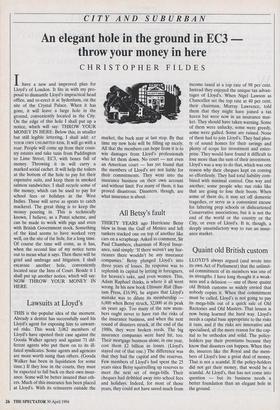All Betsy's fault
THIRTY YEARS ago Hurricane Betsy blew in from the Gulf of Mexico and left tankers stacked one on top of another like cars on a scrapheap. Asked to comment, Sir Paul Chambers, chairman of Royal Insur- ance, said simply: 'If there weren't any hur- ricanes there wouldn't be any insurance companies.' Betsy plunged Lloyd's into three years of losses. Its response was to replenish its capital by letting in foreigners, for heaven's sake, and even women. This, Adam Raphael thinks, is where it all went wrong. In his new book Ultimate Risk (Ban- tam Press, £16.99), he argues that Lloyd's mistake was to dilute its membership — 6,000 when Betsy struck, 32,000 at its peak six years ago. Too many of the new mem- bers ought never to have run the risks of the insurance business, and when the next round of disasters struck, at the end of the 1980s, they were broken reeds. The big insurance companies were hard hit, too. Their mortgage business alone, in one year, cost them £2 billion in losses. (Lloyd's stayed out of that one.) The difference was that they had the capital and the reserves. Few members of Lloyd's had spent the 25 years since Betsy squirrelling up reserves to meet the next set of mega-bills. Their cheques had dribbled away into school fees and holidays. Indeed, for most of those years, they could not have saved much from income taxed at a top rate of 98 per cent. Instead they enjoyed the unique tax advan- tages of Lloyd's. When Nigel Lawson as Chancellor set the top rate at 40 per cent, their chairman, Murray Lawrence, told them that they might have joined a tax haven but were now in an insurance mar- ket. They should have taken warning. Some of them were unlucky, some were greedy, some were gulled. Some are ruined. None of them had to join Lloyd's. They had plen- ty of sound homes for their savings and plenty of scope for investment and enter- prise. They would have found it difficult to lose more than the sum of their investment. Lloyd's was a way to do that, which was one reason why their cheques kept on coming so effortlessly. They had total liability com- bined with minimal control. One way and another, some people who run risks like that are going to lose their boots. When some of them do, it may set off domestic tragedies, or serve as a convenient excuse for faltering prep schools or disheartened Conservative associations, but it is not the end of the world or the country or the City, or even of Lloyd's. It is, though, a deeply unsatisfactory way to run an insur- ance market.


























































 Previous page
Previous page